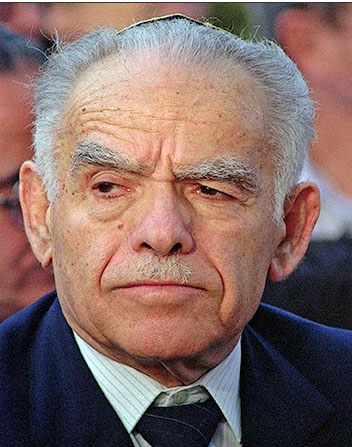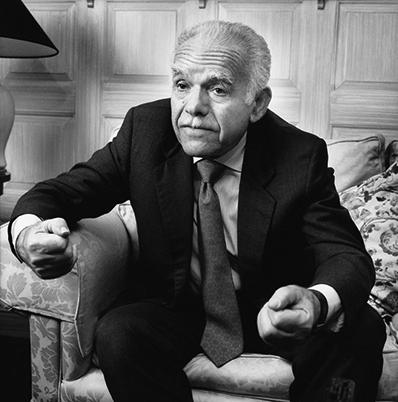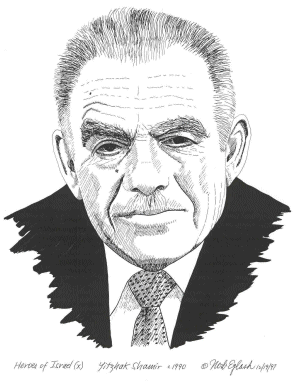<Back to Index>
- 7th Prime Minister of Israel Yitzhak Shamir (Icchak Jaziernicki), 1915
PAGE SPONSOR



Yitzhak Shamir (Hebrew: יצחק שמיר, born Icchak Jaziernicki; October 15, 1915 - June 30, 2012) was a former Israeli politician, the seventh Prime Minister of Israel, in 1983 84 and 1986 92.
Icchak Jeziernicky (later Yitzhak Shamir) was born in Ruzhany (Yiddish: Rozhinoy, Polish: Różana), Russian Empire (now Belarus). He studied at a Hebrew High School in Białystok, Poland. As a youth he joined Betar, the Revisionist Zionist youth movement. He studied at the law faculty of Warsaw University, but cut his studies short to immigrate to what was then the British Mandate of Palestine. In 1935, after settling in Palestine, he Hebraized his surname to Shamir.
In 1944 he married Shulamit Shamir (1923 July 29, 2011), whom he met in a detention camp. Shulamit immigrated to Mandate Palestine from Bulgaria on a rickety boat in 1941 and was sent to prison because she entered the country illegally. They had two children, Yair and Gilada. Shulamit died on July 29, 2011.
Shamir joined the Irgun Zvai Leumi, a Zionist militant group that opposed British control of Palestine. When Irgun split in 1940, Shamir joined the more militant faction, National Military Organization in Israel, also known as the Stern Gang, headed by Avraham Stern.
In 1941 Shamir was imprisoned by British authorities. After Stern was killed by the British in 1942, Shamir escaped from the detention camp and became one of the three leaders of the group in 1943, serving with Nathan Yellin - Mor and Israel Eldad. The group was reformed and renamed Lehi. Shamir sought to emulate the anti - British struggle of the Irish Republicans and took the nickname "Michael" for Irish Republican leader Michael Collins. In October 1944, he was exiled and interned in Africa by British Mandatory authorities. He made an attempt to escape from one of the camps by hiding in a water tank. He was returned, along with the other detainees, after the Israeli Declaration of Independence in 1948. Shortly after Israel was established as a Jewish state, the 1948 Arab - Israeli War broke out. Israel's provisional government initially relied on its paramilitary organizations, including Lehi, to fight against the Arabs, but soon established the Israel Defense Forces.
During the war, Lehi distanced itself from government control. Shamir, Eldad and Yellin - Mor authorized the assassination of the United Nations representative in the Middle East, Count Folke Bernadotte during a truce. Lehi feared that Israel would agree to Bernadotte's peace proposals, which they considered dangerous, unaware that the provisional Israeli government had already rejected a proposal by Bernadotte the day before. The Israeli provisional government reacted by forcibly disbanding Lehi.
In the first years of Israel's independence, Shamir managed several commercial enterprises. In 1955, he joined the Mossad, Israel's external intelligence service, serving until 1965. During his Mossad career, he directed the assassinations of former Nazi rocket scientists working on the Egyptian missile program.
In 1969, Shamir joined the Herut party headed by Menachem
Begin and was first elected to the Knesset in 1973 as a
member of the Likud. He became Speaker of the Knesset in
1977, and foreign minister in 1980, before succeeding
Begin as prime minister in 1983 when he retired.
Shamir had a reputation as a Likud hard liner. In 1977 he presided at the Knesset visit of Egyptian President Anwar Sadat. He abstained in the Knesset votes to approve the Camp David Accords and the Peace Treaty with Egypt. In 1981 and 1982, as Foreign Minister, he guided negotiations with Egypt to normalize relations after the treaty. Following the 1982 Lebanon War he directed negotiations which led to the May 17, 1983 Agreement agreement with Lebanon, which did not materialize.
His failure to stabilize Israel's inflationary economy and to suggest a solution to the quagmire of Lebanon led to an indecisive election in 1984, after which a national unity government was formed between his Likud party and the Alignment led by Shimon Peres. As part of the agreement, Peres held the post of Prime Minister until September 1986, when Shamir took over.
As he prepared to reclaim the office of prime minister, which he had held previously from October 1983 to September 1984, Shamir's hard line image appeared to moderate. However Shamir remained reluctant to change the status quo in Israel's relations with its Arab neighbors, and blocked Peres's initiative to promote a regional peace conference as agreed in 1987 with King Hussein of Jordan in what has become known as the London Agreement. Re-elected in 1988, Shamir and Peres formed a new coalition government until "the dirty trick" of 1990, when the Alignment left the government, leaving Shamir with a narrow right wing coalition.
During the Gulf War, Iraq fired Scud missiles at Israel, many of which struck population centers. Iraq hoped to provoke Israeli retaliation and thus alienate Arab members of the United States assembled coalition against Iraq. Shamir deployed Israeli Air Force jets to patrol the northern airspace with Iraq, but recalled the jets and decided not to retaliate after the United States urged restraint, claiming that Israeli attacks would jeopardize the delicate Arab - Western coalition. In May 1991, as the Ethiopian government of Mengistu Haile Mariam was collapsing, Shamir ordered the airlifting of thousands of Ethiopian Jews, known as Operation Solomon.
Relations with the US were strained in the period after
the war over the Madrid peace
talks, which Shamir opposed. As a result, US
President George H.W. Bush
was reluctant to approve loan guarantees to help absorb
immigrants from the former Soviet Union. Finally, Shamir
gave in and in October 1991 participated in the Madrid
talks. His narrow, right wing government collapsed as a
result over the participation of Palestinians from the
West Bank and Gaza, and new elections were called.
Shamir was defeated by Yitzhak Rabin's Labor in the 1992 election. He stepped down from the Likud leadership in March 1993, but remained a member of the Knesset until the 1996 election. For some time, Shamir was a critic of his Likud successor, Benjamin Netanyahu, as being too indecisive in dealing with the Arabs. Shamir went so far as to resign from the Likud in 1998 and endorse the right wing splinter movement led by Benny Begin, Herut - The National Movement, that later joined the National Union during the 1999 election. After Netanyahu was defeated, Shamir returned to the Likud fold and supported Ariel Sharon in the 2001 election. Subsequently, in his late eighties, Shamir ceased making public comments.
In 2004, Shamir's health declined, with the progression
of his Alzheimer's Disease
and he was moved to a nursing home. The government turned
down a request by the family to finance his stay at the
facility. In June 2006 Makor Rishon reported that
Shamir (then nearing his 91st birthday) no longer
recognized visitors.
Shamir died on the morning of June 30, 2012, at a nursing home in Tel Aviv where he had spent the last few years as a result of the Alzheimer's disease he had suffered since the mid-1990s. He was given a state funeral, which took place on July 2 at Mount Herzl, Jerusalem, and was buried beside his wife, Shulamit.
In 2001, Shamir received the Israel Prize, for his lifetime achievements and special contribution to society and the State of Israel. According to Israeli politician Ruby Rivlin, Shamir was "an honest politician who performed his duties with utter integrity." Former head of Israeli Mossad, Shabtai Shavit, calls him a "remarkably honest man."
In 2005, he was voted the 29th greatest Israeli of all time, in a poll by the Israeli news website Ynet to determine whom the general public considered the 200 Greatest Israelis.
He wrote Sikumo shel davar, published in English in 1994 by Weidenfeld and Nicolson, London, as Summing Up: an autobiography.